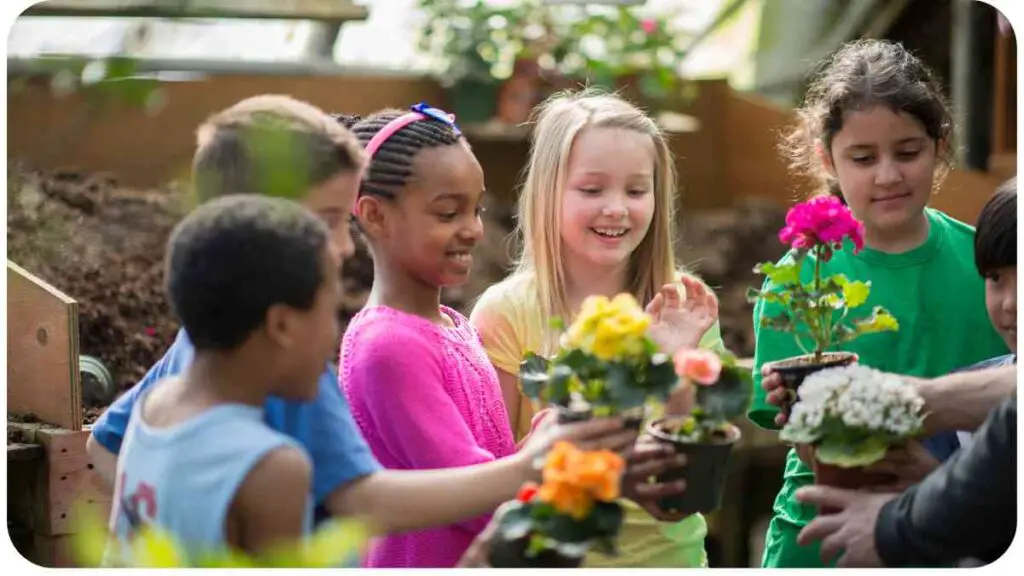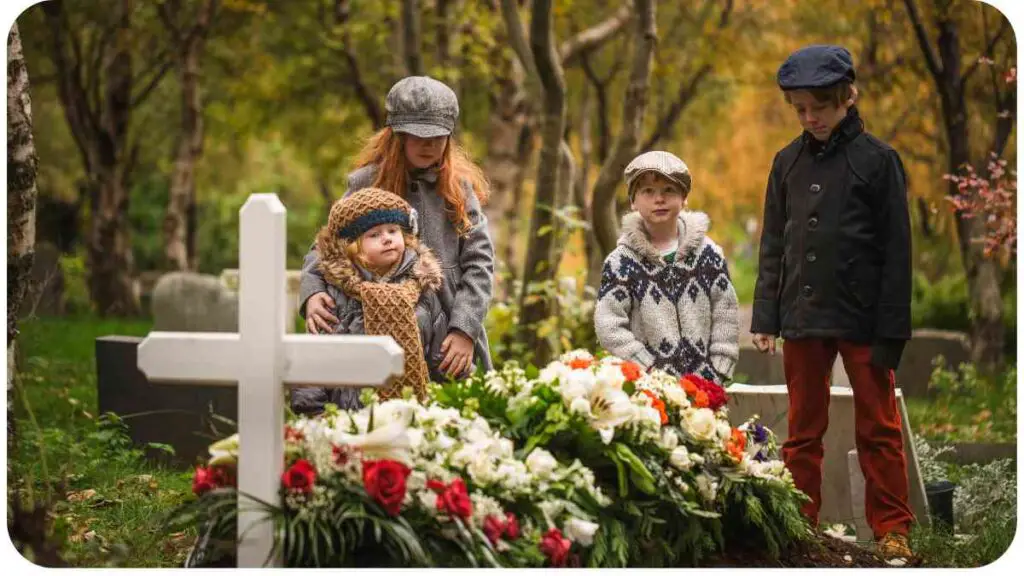Losing a loved one is an incredibly challenging experience, and it can be especially difficult for children who may struggle to understand and cope with their grief. As caregivers, it is crucial for us to provide the necessary support and guidance to help children navigate through this painful process.
In this article, we will explore effective strategies for assisting children in understanding and coping with grief. By following these approaches, we can help them develop healthy coping mechanisms and provide them with the emotional support they need during this difficult time.
| Takeaways |
|---|
| Open communication is crucial when discussing grief with children. |
| Providing emotional support and reassurance helps children navigate their grief. |
| Encouraging expression of feelings through various outlets can be beneficial for children. |
| Recognizing signs that professional help may be needed is important for adequate support. |
| Creating a supportive environment and engaging the community/school can offer additional support. |
| Self-care for caregivers is essential to provide effective support to grieving children. |
| Navigating grief holidays and anniversaries requires sensitivity and flexibility. |
| Involving siblings and friends in the support process is valuable for their healing. |
| Teaching coping techniques helps children manage their emotions during the grieving process. |
| Offering long-term support is necessary as grief is a lifelong journey for children. |
2. Understanding Grief in Children
Grief can manifest differently in children compared to adults. It is essential to recognize these unique manifestations to better understand and support grieving children. Some common signs of grief in children include:
| Manifestations of Grief in Children |
| Feelings of sadness, anger, or guilt |
| Changes in behavior or performance at school |
| Sleep disturbances and nightmares |
| Physical complaints such as headaches or stomach aches |
| Separation anxiety |
| Regressive behaviors |
| Emotional outbursts or mood swings |
Understanding these signs can assist caregivers in identifying when a child is struggling with their grief and may require additional support. It is important to remember that these manifestations may vary from child to child, and each child’s grieving process is unique.
Supporting grieving children during this difficult time can be challenging. Guidance on communicating grief openly and validating emotions can be found in “A Guide for Supporting Grieving Children”. Being attuned to their needs and providing emotional security is so important.
3. Communicating with Children about Grief

Open and effective communication is crucial when discussing grief with children. It can help them process their emotions and feel supported during this challenging time. Here are some effective methods of communication with grieving children:
| Effective Methods of Communication with Grieving Children |
| Encourage open and honest conversations |
| Use age-appropriate language and explanations |
| Listen actively and validate their feelings |
| Be patient and allow them to express themselves |
| Provide reassurance and comfort |
By implementing these strategies, we can create a safe space for children to express their emotions and ask questions about grief. It is essential to be attentive and responsive, showing empathy and understanding throughout the communication process.
Having age-appropriate conversations about death with sensitivity and honesty can help children process their feelings of loss. Seeking “Talking to Children About Death” helps caregivers navigate these difficult discussions with compassion. With patience and understanding, grieving children can find comfort.
4. Providing Emotional Support
During the grieving process, children need emotional support to help them navigate their feelings. Here are some ways to provide emotional support to grieving children:
| Ways to Provide Emotional Support to Grieving Children |
| Offer a listening ear and validate their emotions |
| Provide reassurance and comfort |
| Encourage the expression of feelings through art or play |
| Spend quality time together, engaging in activities |
| Normalize grief and let them know it’s okay to feel sad |
By supporting their emotional well-being, we can help children feel safe and understood during their grief journey.
5. Encouraging Expression of Feelings
Children may struggle to express their grief verbally. Encouraging them to explore creative outlets can provide an alternative means of expression. Here are some outlets for children to express their grief:
| Creative Outlets for Children to Express Grief |
| Drawing or painting |
| Writing in a journal |
| Role-playing or puppetry |
| Creating memory boxes |
| Participating in memorial activities |
Allowing children to express their grief through these creative means can be therapeutic and cathartic for them.
A parent’s role in supporting a child’s journey through grief is pivotal. Resources on “Grieving with Children” provide guidance for answering questions, validating emotions, and maintaining routines during this vulnerable time. Reassurance aids recovery.
6. Addressing Common Concerns
As children navigate through the grieving process, they may have questions and concerns that require gentle and honest explanations. Here are some frequently asked questions about children and grief, along with their respective answers:
7. Creating a Supportive Environment
It is crucial to create a supportive environment that acknowledges and addresses a child’s grief. Here are some strategies to consider:
| Strategies to Create a Supportive Environment for Grieving Children |
| Foster open and non-judgmental communication |
| Maintain regular routines and structure |
| Provide a safe space for emotional expression |
| Encourage connection with supportive family members or friends |
| Seek out support groups or counseling services for additional help |
By implementing these strategies, we can help children feel safe and understood as they navigate their grief.
8. Teaching Coping Techniques
Equipping children with coping techniques can empower them to manage their grief more effectively. Here are some coping techniques to teach children experiencing grief:
Allowing various methods of expression helps grieving children cope in healthy ways. Suggestions for “Helping Children Understand Loss” offer constructive outlets. With empathy and care, even very young children can work through pain.
| Coping Techniques for Children Experiencing Grief |
| Encourage deep breathing and relaxation techniques |
| Engage in physical activities or exercise |
| Practice mindfulness and meditation |
| Encourage journaling or writing down thoughts |
| Foster artistic expression or creative outlets |
These coping techniques can provide children with healthy ways to confront and handle their emotions.
9. Recognizing When Professional Help is Needed
While providing support as caregivers is essential, it’s crucial to recognize when a child may benefit from professional assistance. Here are some signs that indicate a child may need professional help:
| Signs that Indicate a Child May Benefit from Professional Assistance |
| Prolonged or intense grief that does not improve over time |
| Persistent changes in behavior or significant academic decline |
| Social withdrawal or difficulty connecting with others |
| Self-destructive behaviors or thoughts of self-harm |
| Aggressive or impulsive behaviors that are out of character |
If you notice any of these signs or have concerns about your child’s well-being, reaching out to a qualified mental health professional can provide the necessary support and intervention.
10. Providing Long-Term Support
Grief is not something that disappears quickly. It is important to offer long-term support to grieving children as they continue their healing journey. Here are different ways to provide ongoing support:
| Different Ways to Offer Long-Term Support to Grieving Children |
| Check-ins and conversations about their feelings |
| Encourage healthy outlets for emotions, such as therapy or support groups |
| Create rituals or traditions to remember the loved one |
| Engage in activities that honor and celebrate the deceased |
| Provide a safe space for open expression of grief |
By remaining present and available to children in the long term, we can emphasize that their grief is valid and that they are not alone in their healing.
The support of loved ones makes loss more bearable. Links to help with “Supporting Children Through Loss” provide comfort and guidance during mourning. Together, with time and care, healing happens.
11. Helping Children Memorialize the Deceased

Memorializing the deceased can play an essential role in a child’s grief journey. Here are some activities that help children remember their loved ones:
| Activities That Help Children Remember Their Loved Ones |
| Planting a memorial garden |
| Creating memory boxes or scrapbooks |
| Writing letters or drawing pictures to the deceased |
| Lighting candles or saying prayers |
| Sharing stories and memories with others |
These activities provide children with tangible ways to honor and maintain a connection with the person they’ve lost.
12. Supporting Siblings and Friends
When a child experiences grief, it also impacts their siblings and friends. As caregivers, we can offer support not only to the grieving child but also to those around them. Here are some suggestions for supporting siblings and friends during grief:
| Suggestions for Supporting Siblings and Friends during Grief |
| Encourage open communication between siblings and friends |
| Provide opportunities for them to express their own emotions |
| Be available to listen and offer support |
| Help them understand and navigate their own grief experiences |
| Facilitate shared activities or memorializing rituals |
By recognizing the needs of siblings and friends, we can foster a sense of togetherness and mutual support during the grieving process.
13. Self-Care for Caregivers
Supporting a grieving child can also take a toll on caregivers. It is essential to prioritize self-care to ensure we can be present and supportive. Here are some self-care practices for caregivers supporting grieving children:
| Self-Care Practices for Caregivers Supporting Grieving Children |
| Seek support from other caregivers or professionals |
| Engage in activities that bring personal joy and relaxation |
| Maintain a healthy balance between work, caregiving, and personal needs |
| Practice self-compassion and acknowledge your own emotions |
| Set boundaries and ask for help when needed |
Remember that by taking care of ourselves, we can better care for and support grieving children.
14. Navigating Grief Holidays and Anniversaries
Grief-associated holidays and anniversaries can be particularly challenging for children. Here are some tips for navigating these occasions:
| Tips for Navigating Grief-Associated Holidays and Anniversaries |
| Acknowledge and discuss their emotions around these events |
| Encourage participation in rituals or traditions that provide comfort |
| Create new traditions that honor the deceased in a meaningful way |
| Provide a safe space for children to express their feelings |
| Allow for flexibility and adjustments in how these events are celebrated |
Navigating these milestones with sensitivity and understanding can help children feel supported during difficult times.
15. Enlisting Community and School Support
In addition to the support provided by caregivers, involving the community and school can create a network of support for grieving children. Here are some ways to involve the community and school in supporting grieving children:
| Ways to Involve the Community and School in Supporting Grieving Children |
| Inform teachers or school counselors about the situation and provide necessary information about the child’s needs |
| Seek support from local grief support groups or organizations |
| Encourage participation in grief-related programs or workshops |
| Organize community events or fundraisers in memory of the deceased |
| Make use of available resources and services provided by schools or community centers |
By enlisting the support of the community and school, we can widen the support network for grieving children and provide them with additional resources during their journey of healing.
Conclusion
Helping children understand and cope with grief requires patience, empathy, and open communication. By recognizing their unique manifestations of grief, providing emotional support, encouraging expression of feelings, and addressing common concerns, caregivers can play a vital role in supporting grieving children.
Creating a supportive environment, teaching coping techniques, and offering long-term support can further assist children in their healing process. Additionally, involving siblings, friends, and the community, while practicing self-care as caregivers, ensures a comprehensive approach to supporting grieving children.
With these strategies and resources, we can navigate grief alongside children, fostering resilience, and facilitating their journey towards healing and growth.
Further Reading
Here are some additional resources for further reading on helping children understand and cope with grief:
- Child Mind Institute: Helping Children Deal with Grief: This article provides valuable insights on supporting children through the grieving process and offers practical strategies for caregivers.
- Positive Psychology: Grief for Children: This resource explores the unique experiences and emotions that children may face when grieving. It offers guidance on providing appropriate support and understanding their grief journey.
- MyHealth Alberta: Grief in Children: This page from Alberta Health Services provides comprehensive information about grief in children, including common reactions and suggestions for caregivers on how to help children cope.
FAQs
Here are some frequently asked questions (FAQs) about children and grief:
Q: How long does the grieving process typically last for children?
A: The grieving process is individual and can vary greatly. Some children may experience intense grief for an extended period, while others may go through shorter phases of intense grief that lessen over time.
Q: Should young children attend funerals or memorial services?
A: It depends on the child’s readiness and maturity. Assess their understanding and involve them in an age-appropriate manner, as attending such services can provide closure and support the grieving process.
Q: What can I do if my child is afraid of acknowledging their grief?
A: Encourage open communication and create a safe space where they feel comfortable expressing their feelings. Validate their emotions and reassure them that it’s okay to grieve.
Q: Is it normal for a child to exhibit regressive behaviors during grief?
A: Yes, regressive behaviors, such as bedwetting or clinging to parents, can be common responses to grief. Provide reassurance and support, understanding that these behaviors are temporary and a part of their grieving process.
Q: When is it necessary to seek professional help for my child’s grief?
A: If your child’s grief significantly impacts their daily life, relationships, or overall well-being, it may be beneficial to seek professional assistance. A qualified mental health professional can provide guidance and support tailored to your child’s specific needs.

My name is Hellen James. I’m a grief and loss recovery expert who has helped people across the country to move beyond their grief and move forward with their lives.


